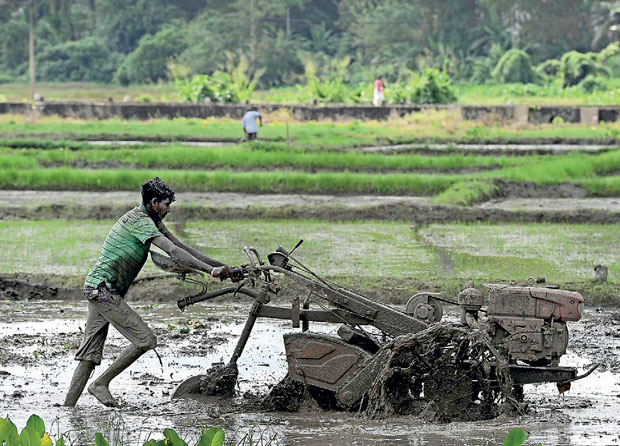15 Feb 2017 - {{hitsCtrl.values.hits}}

 Agriculture is one of the main sectors impacted by the impacts of climate change and its effects are very much felt due to the dependency on the natural resources that this livelihood has. Among the impacts on the agriculture sector are the impacts of the slow onset events of climate change.
Agriculture is one of the main sectors impacted by the impacts of climate change and its effects are very much felt due to the dependency on the natural resources that this livelihood has. Among the impacts on the agriculture sector are the impacts of the slow onset events of climate change.
Under the Cancun Adaptation Framework, the Parties to the United Nations Framework Convention on Climate Change (UNFCCC) recognized the impact of the slow onset events in the context of loss and damage. The slow onset events formulate part of the climate change-induced extreme weather events that evolve gradually from incremental changes occurring over many years or from an increased frequency or intensity of recurring events.
The slow onset events or slow onset processes, hazards or impacts are listed by the UNFCCC as sea level rise, increasing temperatures, ocean acidification, glacial retreat and related impacts, land and forest degradation, loss of biodiversity, desertification and salinisation. Affecting the people over a long period of time, the slow onset events have wide-ranging implications on food security, health and livelihoods of people, particularly in the agricultural sector.
What is salinity?
Salinity is the presence of soluble salts in soils or waters – a natural process which is accelerated and aggravated due to anthropocentric activities and due to the impacts caused by climate change, defined under the slow onset processes. The UNFCCC has recognized two causes for salinisation: the increasing evaporation due to the rising temperatures and the saltwater intrusion into coastal aquifers as a result of the increased evaporation and sea-level rise or flooding.
With the increased accumulation of salt or sodium in the soil and water, particularly in arid environments, salinisation affects the soil structure causing soil degradation, soil erosion and lack of water retention, which adversely affect the agriculture-based livelihoods. Saline soils, which contain large amounts of water-soluble salts, hinder seed germination and plant growth, thereby reducing crop yields.
The coastal areas contribute to the country’s economy and almost a third of the country’s population is concentrated along the coastal belt. With the increasing incidence of extreme and slow onset events such as sea-level rise and inundation, the coastal and low-lying areas are particularly vulnerable to salinisation. The land degradation due to salinity in Sri Lanka is about 223,000 hectares of the total agricultural land area in the country.
Farmer stories from Morawewa
SLYCAN Trust as part of its research work focuses on the areas of Morawewa and Athabendiwewa in the Trincomalee District. During the field visits to these villages, the organisation has interviewed the farmers whose agriculture land is impacted by salinity.
During the course of the visit and in the follow-up interviews with the farmers, it was made clear that salinisation is a real impediment faced by the farmer communities of the region. The farmers we interviewed were mostly dependent on agriculture for livelihood and the land dedicated to paddy cultivation was affected by salinisation.
The farmers also indicated that there were changes in the crop with discolouration in the plants and grains of rice. Many farmers have indicated that even if they are able to carry out agricultural activity on the affected lands, there are other impacts that reduce the price of the crops.
Salinisation therefore could be seen as having a major impact on the quality of the crop and the quantity, given the decreased crop yield. Moreover, soil salinity affects the water sources and irrigation system in this area and in turn contributes to the problems faced in agriculture.
Through research conducted in the area, it was also revealed that the crop yield from an acre of agricultural land was affected on an average by a 50 percent reduction of crop yield. The farmers emphasized that the discolouration of the grain of rice and noticeably the lesser weight, result in having to sell rice at a lower price.
What causes soil salinity?
According to the farmers, one of the possible reasons for increased soil salinity is the increase in temperature resulting in higher amount of evaporation and lack of rain resulting in lesser water retention in the soil and also human activity.
One farmer in Morawewa-North expressed that salinity had affected his crop yield as well and that he has used organic fertilizer and seen improvements in the yield of crops. Similarly, the farmers of the area are considering an experimental shift to climate smart agricultural practices, which would lessen the impacts on the natural nutrient of the soil.
Addressing soil salinity
Using local knowledge, the farmers have tried to find solutions to the issue of soil salinity. Some of these include using paddy husks and ginisiriya (Gliricidiasipium) as a way to desalinise the land. The farmers indicated that leaving the residue of the paddy in the field after the harvesting process helped control the salinity problem to a certain extent.
Even though this seems to be a long-term solution, a farmer in the Morawewa North area attested to the use of dried cow dung and paddy husk as a continuous and long-term method of reducing soil salinity. He said that it took him around seven years to tend to a plot of three acres, one acre of which was affected by salinity, in order to render the soil that could be cultivated.
The slow onset events, as seen in salinisation encountered by the farmers in the Trincomalee area, have socio-economic implications on the lives of these communities. With the increasing incidence of weather events such as drought, the prolonged effects of salinisation are aggravated, further affecting the capacity to cultivate these agricultural lands.
Research, resilience building and capacity building in terms of developing solutions to the salinisation issue are seen as urgent action to be taken. The process of developing policy and climate solutions for salinisation should be focused on and such knowledge disseminated among the farmers, so as to help them address the impacts of salinity that create losses and damages to their agricultural activities.
(Avanthi Jayasuriya works as Programme and Communication Officer at SLYCAN Trust. She holds a degree specialising in English from the University of Colombo and is currently focused on her postgraduate studies in developmental economics. Her research interests include climate change, animal welfare, gender studies, economic development, transitional justice and peace studies)
09 Jan 2025 3 hours ago
09 Jan 2025 5 hours ago
09 Jan 2025 7 hours ago
09 Jan 2025 8 hours ago
09 Jan 2025 8 hours ago